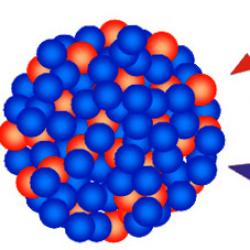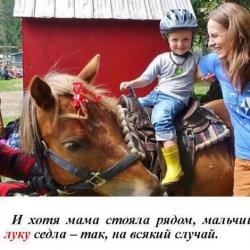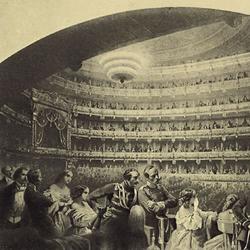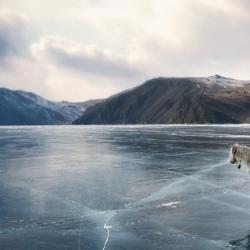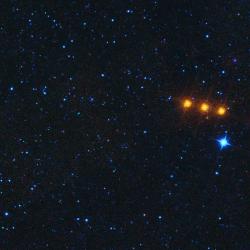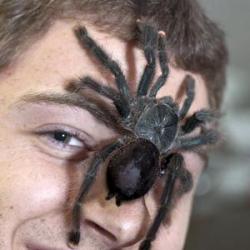Evgeny Baratynsky. Biography. Obituary of Evgeny Baratynsky Baratynsky Evgeny Abramovich: biography
Evgeny Baratynsky was considered by his contemporaries to be the greatest poet of Russia. His elegies and epigrams were read in literary salons. His fellow poets admired his descriptions of nature and love lyrics. For unknown reasons, he was relegated to the background, but remains a significant figure in Russian poetry of the 19th century.
Childhood and youth
Evgeny Abramovich Baratynsky was born on February 19, 1800 in the family of retired Lieutenant General Abram Andreevich Baratynsky and Alexandra Fedorovna, nee Cherepanova. Both spouses belonged to the highest nobility. Abram Andreevich was a member of the retinue of the Life Guards Grenadier Regiment. Alexandra Feodorovna was educated at the Smolny Institute for Noble Maidens and served the Empress.
For their faithful service to the brothers Abram and Bogdan, the emperor presented the Vyazhlya estate in the Tambov province, where Evgeniy, the eldest son among eight children, was born. In 1804, the owners divided the property and Abram Andreevich’s family moved to the outskirts of Vyazhlya, where a brand new manor estate, Mara, was built on the edge of a picturesque ravine. The poet spent his early childhood there. The elegy “Desolation”, dedicated to memories, was written in Mara.
The teacher of Evgeniy and his brothers was the Italian Giacinto Borghese, to whose memory the poet dedicated the poem “To the Italian Uncle” shortly before his death. The family spoke French, and the first letters the boy sent home from the St. Petersburg boarding school were written in French. At the age of eight, Baratynsky began learning German in a private boarding school, and at twelve he entered the Corps of Pages.

In 1810, the father suddenly died, the family returned to the estate from St. Petersburg. The preparation of her son for admission to the most prestigious institution of the Russian Empire was supervised by his mother. From letters to his mother, the poet's biographers know about his mood at that time. The teenager had a gloomy way of thinking, read philosophical treatises, but was preparing for service in the navy.
The plans were not destined to come true. In the spring of 1814, the young man was left for the second year for poor diligence in his studies. The company of Evgeniy’s friends devoted most of their time not to lessons, but to pranks. The self-named “Avenger Society” tormented unloved teachers with cruel jokes. The fun ended badly - friends stole a tortoiseshell snuffbox in a gold frame along with money from the father of one of the boys.

As a result, the company, by personal order of General Zakrevsky, was expelled from the Corps for theft without the right to enter other educational institutions. It was possible to serve only with the rank of soldier. This story changed Baratynsky’s fate. He returned to the estate, thought a lot and began to write poetry.
The poet's brother, Irakli Abramovich Baratynsky, who successfully graduated from the Corps of Pages, rose to the rank of lieutenant general. He served as governor of Yaroslavl, then of Kazan, and sat in the Senate.
Literature
In 1819, his creations began to be published in magazines. Contemporaries valued Baratynsky's work for the depth of his emotions, tragedy and hysteria. The elegant style and interweaving of verbal lace, the originality of the style were praised by the poet’s friends, who were the first critics.

Anton Delvig was the first to appreciate his extraordinary talent and published one of Baratynsky’s poems without the author’s knowledge. Pyotr Pletnev, Nikolai Gnedich, admired the work of the young poet.
Baratynsky wrote his famous lyric poems and the poem “Eda” while serving in Finland, where he spent five years as a non-commissioned officer. The poet was inspired by the beauty of the wild northern nature and the lovely Countess Agrafena Zakrevskaya, wife of the Governor-General of Finland Arseny Zakrevsky. Nature and emotion are woven together in the image of a stream in the poem “Waterfall.”

There are several interesting facts about Baratynsky that are not usually taught in literature classes. For example, about the monstrous illiteracy of the poet. Although fluent in Italian, French and German, the poet did not know the grammar and punctuation of the Russian language. The only punctuation mark he recognized was the comma. Before publication, I gave the poems to Delvig for editing.
He handed the manuscript to his wife, Sofya Mikhailovna, with a request to rewrite it to the point. But there were no periods - the poems ended with commas. Evgeniy even wrote his own last name differently. He signed the first poems: “Evgeny Abramov, son of Baratynskaya.” In the publication of works and in the last collection, the variant “Boratynsky” was used.

The family surname comes from the name of the Boratyn castle in Galicia. The variant with the letter O is engraved on the tombstone, and the spelling with the letter A was fixed in the biography thanks to the letters of Pushkin, who, talking about the works of a friend, called him “Baratynsky”.
The poetry of Yevgeny Baratynsky was criticized from different points of view. The Decembrists reproached the poet for his lack of civic position and the excessive influence of classicism. There was too much romanticism in the texts for critics, but not enough for regulars of literary drawing rooms. By the end of his life, the author himself edited his early works, removing lyricism and formal style from them, which also did not find understanding among fans of the talent.
Personal life
The poet was married to Anastasia Lvovna Engelhardt, the daughter of a major general. As a dowry for his wife, Evgeniy received a strong position in secular society and rich estates, in particular Muranovo, located near Moscow, which became the family nest of a large family, and later a museum named after. There still stands a house built under the leadership of Baratynsky, and the forest he planted is growing.

The young people got married on June 9, 1826. However, by the standards of the 19th century, at 22 years old, Anastasia was already considered a completely mature person. She was reputed to be smart, but ugly, and was distinguished by her delicate literary taste and nervous character. The marriage produced nine children.
The young husband abandoned his dreams and started arranging his life. According to letters, Baratynsky from the thirties seems to be a conscientious owner and father. The poems “Spring, spring! how clean the air is!”, in which the poet simply enjoys life, and “A wonderful city will sometimes merge,” in which he notes that “instant creatures of a poetic dream disappear from the breath of extraneous vanity.”
Death
The latest collection of poems, Twilight, was severely criticized by critics. He especially distinguished himself, with whom Baratynsky argued until his death. According to the opinion, Belinsky is guilty of Baratynsky’s early death, since he wounded the poet’s sensitive soul with a dismissive tone and offensive comparisons.

In the fall of 1843, Baratynsky and his wife set off on a trip to Europe. Visits major cities in Germany, lives six months in Paris. In the spring of 1844, travelers sail from Marseille to Naples. At night, the poet wrote a prophetic poem “Piroskaf”, in which he expressed his readiness to die.
In Naples, Anastasia Lvovna had a seizure, which greatly affected her husband. The headaches that had long tormented Baratynsky intensified. The next day, June 29, 1844, the poet died. The official cause of death was stated as cardiac rupture. In August 1845, the poet’s body returned to his homeland, St. Petersburg. Evgeny Baratynsky was interred at the Novo-Lazarevskoye cemetery, located on the territory of the monastery.
Bibliography
- 1826 – poem “Eda”
- 1826 – poem “Feasts”
- 1827 – collection of poems
- 1828 – poem “Ball”
- 1831 – poem “The Concubine” (original title “Gypsy”)
- 1831 – story “The Ring”
- 1835 – collection of poems in two parts
- 1842 – collection of poems “Twilight”
- 1844 – “Pyroscap”
And the famous Russian poet of the Golden Age was born into a noble family. His father was a landowner, a retired lieutenant general. As a child, Boratynsky studied at a private German boarding school in St. Petersburg, and at the age of 12 he was sent to the Corps of Pages. However, pranks and refusal to obey the orders of the corps led to the fact that two years later he was expelled from there with a ban on entering military service except as a private.
After this, the young man lived on his relatives’ estates for several years and began writing poetry. At the beginning of 1819, Boratynsky finally decided to follow in the footsteps of his ancestors and entered the Life Guards Jaeger Regiment as a private. He settled in the same apartment with Delvig, became friends with Pushkin, Kuchelbecker, Gnedich and began to publish. In 1820, Boratynsky received the rank of non-commissioned officer and was transferred to his relative’s regiment stationed in Finland. The harshness of northern nature made a great impression on this romantic poet. In 1824, he was appointed to the headquarters of General Zakrevsky, where he became interested in his wife, “Copper Venus” Pushkin. The following year he was promoted to officer. In 1826, due to his mother’s illness, Boratynsky retired and settled in Moscow, marrying Anastasia Engelhardt, the cousin of Denis Davydov’s wife.
After the publication of the poems “Eda” and “Feasts” in 1826, public opinion placed him among the best poets of his time. From 1828 to 1831, Boratynsky was in the civil service, in particular as a provincial secretary. After his retirement, Boratynsky went into private life, organizing his wife’s dowry - the Muranovo estate (later - the Tyutchev Museum, a relative of the Engelhardts).
In 1843, Boratynsky went on a trip abroad with his wife and three of his nine children. In Naples he died of a broken heart.
Along with writing the surname through O - Boratynsky, the variant with the letter A was more common for a long time. It was entrenched in encyclopedias and dictionaries, and not the least role in resolving this issue was played by the fact that Pushkin, speaking about his friend’s poetry, wrote about him "Baratynsky".
Meanwhile, the spelling of the surname with O has dominated literary criticism since the 1990s and is confirmed by biographical information. Thus, the surname of the Boratynsky family, as stated in the work of the poet’s nephew, comes from the name of the Boratyn castle in Galicia. After one of the representatives of the family became a Russian citizen, due to the peculiarities of the new language, the letter A began to predominate in the spelling. It is known that the double version of the surname caused a lot of trouble when it came to official documents. Thus, a letter from the poet’s son, Nikolai Evgenievich Boratynsky, has been preserved, in which he points out an error in the papers and explains its origin: “...let me draw your attention to the fact that in the documents presented my surname is written Ba-, and not Boratynsky, while the native spelling is Boratynsky...<...>The alien letter originated from the Russian habit of pronouncing O as A, but in letters one can often mistake this letter for the second..."
Boratynsky himself signed the first verses as “Evgeniy Abramov, son of Baratynskaya.” However, in the official publication of his works and in his last collection, he used a different option in the signature - “Boratynsky”. Also - through O - his surname is immortalized on the poet’s tombstone in the Alexander Nevsky Lavra.
Last name spelling
Most publications in literary magazines and individual publications of the 1820s - 1830s are signed with the surname Baratynsky. However, the last book of poems prepared by the poet for publication - “Twilight” - is signed with an “o”: “Twilight. Essay by Evgeniy Boratynsky.” At the beginning of the 20th century, the spelling of the poet’s surname with “o” prevailed; in Soviet times, with “a”. In the 1990-2000s, the spelling Boratynsky began to be actively used again; this is how his last name is written in the Complete Works edited by A. M. Peskov and in the Great Russian Encyclopedia.
Biography
Childhood and youth
After leaving the page corps, Evgeny Baratynsky lived for several years, partly with his mother in the Tambov province, partly with his uncle, his father’s brother, retired vice-admiral Bogdan Andreevich Baratynsky, in the Smolensk province, in the village of Podvoisky. While living in the village, Baratynsky began to write poetry. Like many other people of that time, he willingly wrote French couplets. Since 1817, Russian poetry has reached us, although very weak. But already in 1819, Baratynsky had completely mastered the technique, and his verse began to acquire that “non-general expression”, which he himself later recognized as the main advantage of his poetry. In his uncle’s village, Baratynsky found a small society of young people who were trying to live a cheerful life, and he was carried away by their fun.
Military service

E. Baratynsky
In Moscow
In Moscow, Baratynsky met with a circle of Moscow writers Ivan Kireevsky, Nikolai Yazykov, Alexei Khomyakov, Sergei Sobolevsky, Nikolai Pavlov.
In Moscow, on June 9, 1826, Baratynsky married Nastasya Lvovna Engelhard (the wedding took place in the Kharitonia Church in Ogorodniki); At the same time, he entered service in the Boundary Office, but soon retired. His wife was not beautiful, but she was distinguished by her intelligence and delicate taste. Her restless character caused a lot of suffering to Baratynsky himself and influenced the fact that many of his friends moved away from him. In a peaceful family life, everything that was violent and rebellious in Baratynsky gradually smoothed out; he himself confessed: “I locked the door to the merry fellows, I am fed up with their exuberant happiness, and have now replaced it with decent, quiet voluptuousness.”
Baratynsky's fame as a poet began after the publication, in 1826, of his poems "" and "" (in one book, with an interesting preface by the author) and, in 1827, the first collection of lyric poems - the result of the first half of his work. In 1828 the poem “” appeared (together with Pushkin’s “Count Nulin”), in 1831 - “” (“Gypsy”), in 1835 - the second edition of small poems (in two parts), with a portrait.
Outwardly, his life passed without visible shocks. But from the poems of 1835 it becomes clear that at that time he experienced some kind of new love, which he calls “the darkening of his painful soul.” Sometimes he tries to convince himself that he has remained the same, exclaiming: “I pour my glass, I pour it as I poured it!” Finally, the poem “Glass” is remarkable, in which Baratynsky talks about those “orgies” that he organized alone with himself, when wine again awakened in him “revelations of the underworld.” He lived sometimes in Moscow, sometimes on his estate, in the village of Muranovo (not far from Talits, near the Trinity-Sergius Lavra), sometimes in Kazan, did a lot of housework, sometimes traveled to St. Petersburg, where in 1839 he met Mikhail Lermontov, in society He was valued as an interesting and sometimes brilliant conversationalist and worked on his poems, finally coming to the conviction that “there is nothing more useful in the world than poetry.”
Modern criticism reacted to Baratynsky’s poems rather superficially, and the literary enemies of Pushkin’s circle (the magazine “Blagonamerenny” and others) quite diligently attacked his supposedly exaggerated “romanticism.” But the authority of Pushkin himself, who highly valued Baratynsky’s talent, was still so high that, despite these voices of critics, Baratynsky was recognized by general tacit consent as one of the best poets of his time and became a welcome contributor to all the best magazines and almanacs. Baratynsky wrote little, working for a long time on his poems and often radically altering those already published. Although a true poet, he was not a writer at all; in order to write anything other than poetry, he needed an external reason. So, for example, out of friendship for the young Alexander Muravyov, he wrote an excellent analysis of the collection of his poems “Tavrida”, proving that he could become an interesting critic. Affected by the criticism of his poem "The Concubine", he wrote an "anti-criticism", somewhat dry, but in which there are very wonderful thoughts about poetry and art in general.
The news of Pushkin’s death found Baratynsky in Moscow precisely in those days when he was working on “Autumn.” Baratynsky abandoned the poem, and it remained unfinished.
"Twilight"
Newspapers and magazines barely responded to his death. Belinsky then said about the late poet: “A thinking person will always re-read Baratynsky’s poems with pleasure, because he will always find a person in them - a subject eternally interesting to a person.”
Baratynsky's works in poetry and prose were published by his sons in 1884.
Creative biography
Baratynsky began writing poetry as a young man, living in St. Petersburg and preparing to join the regiment; at this time he became close to Delvig, Pushkin, Gnedich, Pletnev and other young writers, whose society had an influence on the development and direction of his talent: with his lyrical works he soon took a prominent place among the poets of the Pushkin circle, the “romantic” poets.
In his early poems, Baratynsky develops the pessimistic worldview that he developed from childhood. His main position is that “in this life” one cannot find “direct bliss”: “the heavenly gods do not share it with the earthly children of Prometheus.” According to this, Baratynsky sees two parts in life: “either hope and excitement (painful worries), or hopelessness and peace” (calmness). Therefore, Truth invites him to teach him, passionate, “gratifying dispassion.” Therefore, he writes a hymn to death, also calls it “pleasant”, recognizes the insensibility of the dead as “blessed” and finally glorifies the “Last Death”, which will calm all existence. Developing these ideas, Baratynsky gradually came to the conclusion about the equivalence of all manifestations of earthly life. It begins to seem to him that not only did the gods give “the same wing to both joy and sorrow” (dual number = wings), but that good and evil are equal.
A long stay in Finland, far from intelligent society, among harsh and wild nature, on the one hand, strengthened the romantic character of Baratynsky’s poetry, and on the other, gave it that concentrated, elegiac mood that permeates most of his works. The impressions of Finnish life, in addition to a number of small poems evoked by them, were reflected with particular vividness in Baratynsky’s first poem, “Eda” (), which Pushkin welcomed as “a work remarkable for its original simplicity, the charm of the story, the vividness of colors and the outline of characters, slightly, but masterfully designated." Following this poem came “Ball”, “Feasts” and “Gypsy”, in which the young poet noticeably succumbed to the influence of Pushkin and even more so to the influence of the “ruler of thoughts” of his contemporary generation - Byron. Distinguished by their remarkable mastery of form and the expressiveness of their elegant verse, which is often not inferior to Pushkin’s, these poems are usually still ranked lower than Pushkin’s lyrical poems.
Baratynsky’s last years were marked by increasing loneliness in literature, a conflict both with long-time opponents of Pushkin’s circle (literators like Polevoy and Bulgarin), and with emerging Westerners and Slavophiles (the editors of “Moskvityanin”; Baratynsky dedicated epigrams to both). In Baratynsky published his last, most powerful collection of poems - “Twilight. Essay by Evgeny Baratynsky." This book is often called the first “book of poetry” or “author’s cycle” in Russian literature in a new sense, which will be characteristic of poetry at the beginning of the 20th century.
Grade
Pushkin, who highly valued Baratynsky, said this about him: “He is original with us - because he thinks. He would be original everywhere, because he thinks in his own way, correctly and independently, while he feels strongly and deeply.”
Contemporaries saw in Baratynsky a talented poet, but a poet primarily of the Pushkin school; Critics did not accept his later work. Literary studies of the second half of the 19th century considered him a minor, overly rational author. This reputation was influenced by contradictory (sometimes of the same poem) and equally categorical assessments of Belinsky. So in ESBE (literary edition of Semyon Vengerov) he is assessed as follows: “As a poet, he almost completely does not succumb to the inspired impulse of creativity; as a thinker, he is deprived of a definite, fully and firmly established worldview; These properties of his poetry are the reason why it does not make a strong impression, despite the undoubted advantages of the external form and often the depth of content ... "
A revision of Baratynsky's reputation was begun at the beginning of the 20th century by Russian Symbolists. He began to be perceived as an independent, major lyricist-philosopher, standing on a par with Tyutchev; in Baratynsky, features close to the Symbolists themselves were emphasized. Almost all the major Russian poets of the 20th century spoke warmly about Baratynsky.
Quote
My gift is poor, and my voice is not loud,
But I live, and the land is mine
Existence is kind to someone:
My distant descendant will find it
In my poems; who knows? my soul
Will find himself in intercourse with his soul,
And how I found a friend in a generation,
I will find a reader in posterity.
Bibliography
- Collection of poems Baratynsky first published in 1827 (2nd ed., Moscow, 1835; 3rd - 1869 and 4th - 1884, Kazan).
Literature
- Dmitry Golubkov The disease of existence. - M.: Soviet writer, 1974. - 400 p.
Notes
Links
| Evgeny Baratynsky in Wikiquote | |
| in Wikisource | |
| Evgeny Baratynsky on Wikimedia Commons |
Like life's common calls,
Like the hobbies of vanity,
You understand the impulses of passions
And the promise of dreams;
All the breaths are clear to you,
Which in the sea of existence
Our boat is obedient.
I bring you songs,
Where is my life reflected?
Filled with deep melancholy,
Contradictions, blindness
And meanwhile, high love,
Love, kindness and beauty.
Happy son of solitude,
Where are the hearts' windy dreams?
And thoughts are idle aspirations
Reasonably I was put to sleep;
Where, friend of peace and freedom,
Neither to fortune, nor to fashion,
I have no need for rumors;
Where I forgave madness, malice
And I forgot, as if in a grave,
But voluntarily, noisy light,—
I still leave sometimes
I am Letu, created by me,
And I fly around the steppes of the world
With melancholy, hot and alive.
I'm looking for you, looking: what's wrong with you?
Where are you thrown by fate?
You who illuminated me
And friendship with gentle rays,
And by the light of the highest fire?
What does Providence give you?
How is heaven testing you?
And I raise a pleading voice:
May your rapture last,
Yes, the sorrowful hour will soon pass!
Star of a scattered galaxy!
So from my wilderness I strive
I look at you with caring glances,
I pray to you for the highest goodness.
To distract harsh fate from you
I want terrible blows,
Although I'll tell you the postal prose
I lazily pay my tribute.
Notes
First published in Sovremennik in 1836, vol. IV, pp. 216-218, under the title “To Prince P. A. Vyazemsky” and signed by E. Baratynsky. This poem, in italics, opened the collection “Twilight” (pp. 5-13) (originally called “The Dream of an Earthly Night” by the poet), which was dedicated to “Prince Peter Andreevich Vyazemsky.”
The poem was attributed by the publishers to the period 1835-1842. (in fact, it was written no later than 1836), and this uncertainty, as well as the fact that it was a dedication to “Twilight,” led many to consider it an expression of Boratynsky’s feelings at a time when he remained “the star of the scattered Pleiades,” that is, after the death of Baron Delvig, Pushkin, etc., while Pushkin was still alive. Moreover, Boratynsky calls “the star of the scattered Pleiades” not even himself, but Prince P. A. Vyazemsky, who still belonged to the old generation.
Sending his collection to Prince P. A. Vyazemsky, Boratynsky wrote: “This small collection of poems was devoted to embossing almost, if not solely, in order to take advantage of your permission to print the dedication. Accept both with your usual goodwill towards the author” (“Antiquity and Newness”, book 5, p. 55).
Prince Pyotr Andreevich Vyazemsky (born July 12, 1792, died November 10, 1878) - famous critic and poet; according to P. A. Pletnev
(Works. vol. I, pp. 547-572, article published in Sovremennik in 1844, vol. XXXV, pp. 298-329 - “Evgeniy Abramovich Baratynsky”), “he fully appreciated Baratynsky’s talent and loved his wonderful , subtle mind. Their repeated meetings in Moscow established a friendship based on mutual spiritual respect. Two talents, so famous among us for their wit, taste, education, best tone, playfulness and strength of style, alien to petty rivalry, gladly communicated to each other their opinions on subjects that occupied their curiosity.” And the book. Vyazemsky retained this friendly feeling towards Boratynsky until the end of his days and in 1869 he cordially welcomed the publication of the works of his friend, whose poetic talent he greatly appreciated (Works of Vyazemsky, ed. by S. D. Sheremetev, St. Petersburg 1882, vol. VII , pp. 268-269).
See also Prince Vyazemsky’s reviews of Boratynsky in the Ostafyevsky Archive and Boratynsky’s letters in book 5 of “Antiquity and Novelty”.
In 1828, the almanac “Northern Flowers” (published by Pushkin and Delvig) appeared Baratynsky's poem under an expressive title "The Last Death". Later, analyzing this poem, Belinsky will call it the “apotheosis” of all Baratynsky’s poetry.
Compositionally, the poem is divided into 3 parts - three visions appear before the author, reinforcing the terrifying pictures of the death of all living things, as a natural result of the dominion of technology. Three visions - three historical eras of further development of mankind. The first one captivates with its grandeur:
First the world showed me a wondrous garden;
Everywhere there is art, an abundance of signs;
The whole city is near and the hail is near,
There are palaces, theaters, water cannons everywhere.
But this era of the “bright world” owes its heyday to the subjugation of natural elements - a gap occurs between man and nature:
There are people everywhere, and their own cunning law
He forced the elements to admit everything.
The seas are rebellious depths
On the islands of artificial settlements,
Already cutting through the heavenly plains...
By subjugating the “heavenly elements”, forcing the “winds, rains, heat and cold” to serve, destroying hunger, man upset the invisible balance that always exists in nature:
...and the beast of prey disappeared
In the darkness of the forests and in the heights of the skies,
And in the abyss of water, struck down by man.
But everything still seems unshakable in this kingdom of reason, seething and seething vitality:
Everything on earth was breathing movement,
Everything on earth seemed to rejoice.
Centuries pass and another era begins. Humanity has changed beyond recognition - thoughts and passions have disappeared, earthly desires have disappeared, and the kingdom of unlimited fantasy has arrived:
Fantasy took over their existence,
And gave in to mental nature
The bodily nature between them:
Carried them into the empyrean and into chaos
A living thought on its wings...
People doomed themselves to complete disappearance, to extinction:
But they walked on the ground with difficulty,
And their marriages were fruitless.
The third era is the era of destruction and death:
The last families were decaying;
Cities stood in ruins...
It seems like time has turned back:
And in the wild purple of ancient years:
The sovereign nature has clothed itself.
Technical progress has led to the disappearance of people, but nature is eternal, because it is stronger than man:
Majestic and sad was the shame
Desert waters, forests, valleys and mountains.
Still, life-giving to nature,
The luminary of the day has risen into the sky,
But on earth there is nothing to his rise
There was no way to say hello.
One fog above her, turning blue, curled
And the purifying sacrifice was smoking.
The unlimited dominance of reason, the technical achievements of the era of “enlightenment” are preparing humanity for the “final death”, since they violate the eternal harmony in the established and established relations between man and nature, Baratynsky is convinced. Harmony between the spiritual life of society and technological progress is impossible, unthinkable (just as spiritual interests and material interests are incompatible). “Life as the prey of death, reason as the enemy of feeling, truth as the destroyer of happiness” - this is where the elegiac tone of Baratynsky’s poetry comes from. In this poem, Baratynsky’s “anti-Enlightenment skepticism” was manifested with particular force, emphasizes I.M. Semenko, - and he is doubly a skeptic in relation to the ideals of the wise.”
Perhaps it is no coincidence that among the recurring elegiac motifs of Baratynsky’s poetry of the 1830-1840s. there is a longing for beauty, for the merging of the poet’s soul with the natural world:
What’s wrong with her, what’s wrong with my soul?
With a stream she is a stream
And with a bird, a bird! murmuring with him,
Flying in the sky with her!
Then makes her so happy
And sun and spring!
Does she rejoice, like the daughter of the elements,
Is she at their feast?
What needs! happy is whoever is on it
Oblivion of thought drinks,
Who is far from her
He, marvelous, will take it away!
"Spring, Spring", 1834
The poet prefers minutes of joyful communication with the natural world to the temptations of worldly vanity, fame, even “dreams of freedom.”
1 Baratynsky will express these thoughts about the enmity of progress and spiritual life in his poem “Signs” (1839):
Until man of nature tortured
Crucible, scales and measure,
But as a child I listened to the broadcasts of nature
I caught her signs with faith,
As long as he loved nature, she
She answered him with love.
Humanity flourished - man and nature were one:
He is full of friendly concern
I found a language for him.
But the irreparable happened; because a person:
But, despising feeling, he trusted his mind;
I got lost in the hustle and bustle of research...
And the heart of nature closed to him,
And there are no prophecies on earth.

